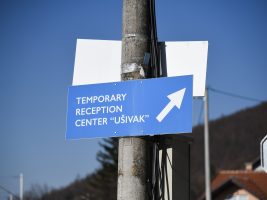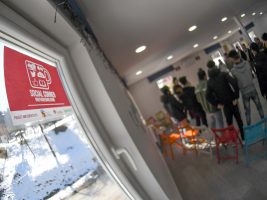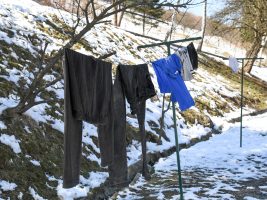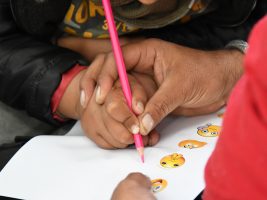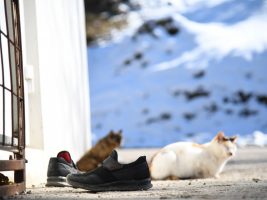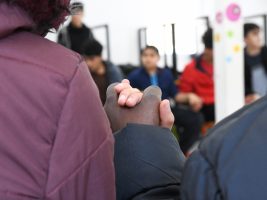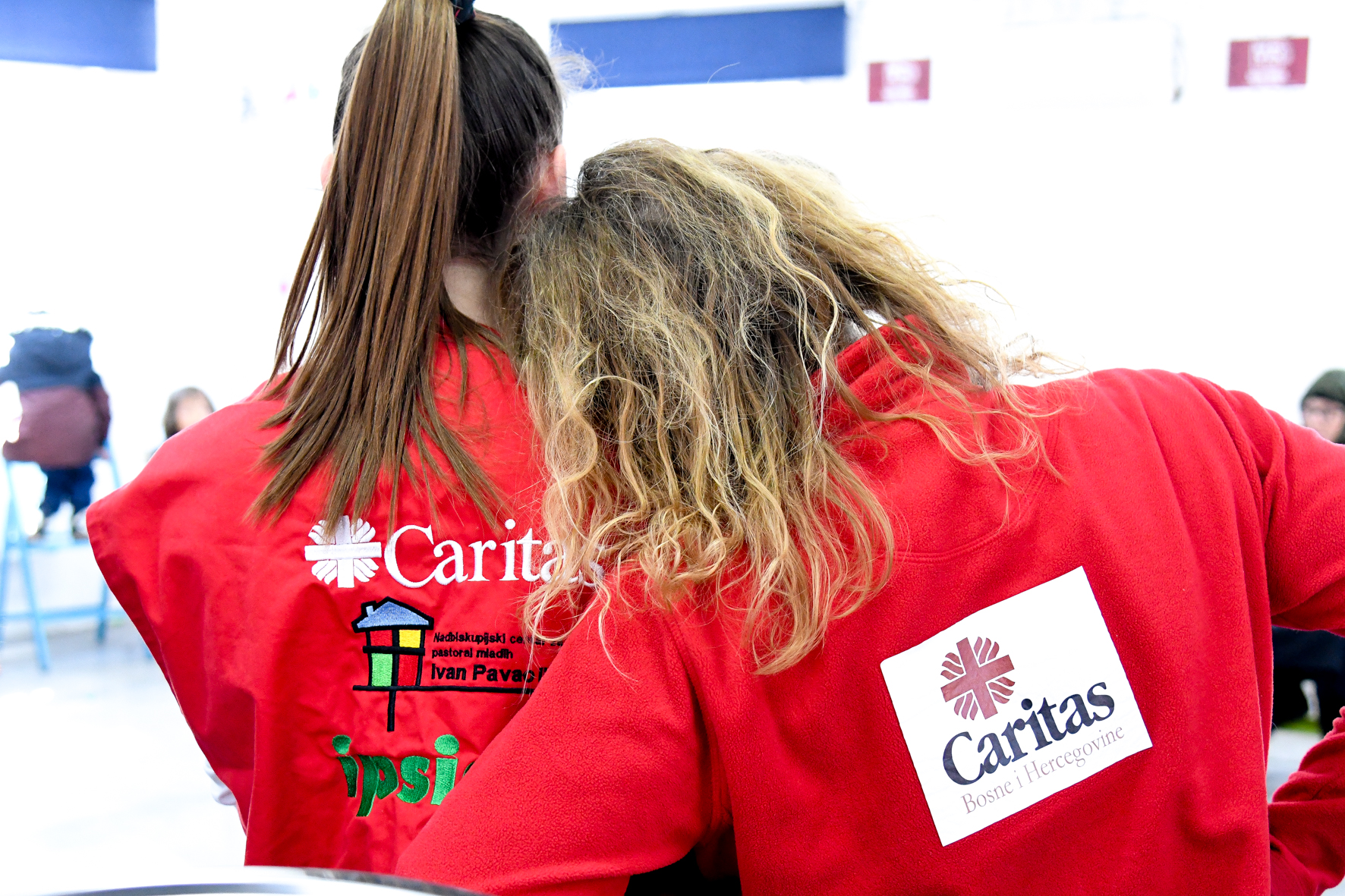
(from Ušivak) Eleven-year-old Sahim comes from Pakistan, but he says he cannot remember the name of the city. His eyes are big and black, like his hair, he walks around in flip-flops, despite the cold and snow, in the temporary reception centre in Ušivak, near Sarajevo. He has been living there alone for almost eight months. His father successfully attempted to cross the borders of the Balkan countries in an attempt to enter the EU, his final destination, at the cost of his life – a dangerous journey migrants and refugees call “the Game.” He followed impervious paths, he managed to avoid the freezing cold weather, barbed wires, wild animals, barriers, thermal cameras, minefields, drones, police, truncheons and paramilitary squads. He is now believed to be in Germany. But Sahim couldn’t make it: the truck in which his father had hidden him to secretly cross the Croatian border was seized by the border police, who discovered him and sent him back to Ušivak. Not much is known about his mother, “maybe she is in France”, ” she might be dead”, say the camp workers. Now Sahim is waiting for his father to file for family reunification and bring him to Germany. But it will take a long time. He must first a job, build a new life and only then will he be able to embrace his son again. In the meantime, the young boy is kicking a deflated football and spending time with other migrant children in the centre’s ‘Social Corner’, cared for by five Italian Caritas ‘white helmets’ who carry out their civil service here, including giving school lessons, organising handicraft workshops, as well as recreation activities for the children.
A gift from Pope Francis. The Social Corner, opened in October 2020, was made possible thanks to a donation by Pope Francis. The Pope has in so doing sustained a number of projects for the reception of migrants along the Balkan Route, which runs from Greece up the Balkan Peninsula to the EU countries. It is the only passage into Europe for thousands of migrants. The Social Corners of two temporary reception camps in Bosnia-Herzegovina, Ušivak (Sarajevo) and Sedra, near Bihac, on the border with Croatia, are amongst the most remarkable of these projects. The Social Corner consists of a prefabricated building offering workshops and handicraft activities, language courses and games. A place where volunteer workers distribute tea or warm coffee every day.
 “Game is over.” At the Social Corner in Ušivak people are singing and dancing to the beat of the drums. Caritas Bosnia volunteers and Italian Caritas white helmets have organised a party for younger and older children and their families. Afterwards there is pizza for everyone. The outdoor theatre’s concrete steps, adorned in the colours of peace, are filled with people attracted by the music. Their facial features reflect their origins: Iran, Afghanistan, Pakistan, Syria, Iraq, Africa and even Cuba. “We are currently housing approximately 200 people”, Gorana Lovric, Social Corner coordinator, told SIR. “The Ušivak camp is designed to accommodate families and unaccompanied minors, with a capacity of up to eight hundred people. Our task at the Social Corner is to welcome migrants, help them, with due respect for their dignity as human beings, as Pope Francis teaches us. We do this with simple gestures, like offering them a cup of tea or coffee. By doing this we are able to talk to them, share their stories, and understand what they need.
“Game is over.” At the Social Corner in Ušivak people are singing and dancing to the beat of the drums. Caritas Bosnia volunteers and Italian Caritas white helmets have organised a party for younger and older children and their families. Afterwards there is pizza for everyone. The outdoor theatre’s concrete steps, adorned in the colours of peace, are filled with people attracted by the music. Their facial features reflect their origins: Iran, Afghanistan, Pakistan, Syria, Iraq, Africa and even Cuba. “We are currently housing approximately 200 people”, Gorana Lovric, Social Corner coordinator, told SIR. “The Ušivak camp is designed to accommodate families and unaccompanied minors, with a capacity of up to eight hundred people. Our task at the Social Corner is to welcome migrants, help them, with due respect for their dignity as human beings, as Pope Francis teaches us. We do this with simple gestures, like offering them a cup of tea or coffee. By doing this we are able to talk to them, share their stories, and understand what they need.
We are ears prepared to listen and open arms ready to embrace them.
People with stories of poverty and despair who are asking nothing except to be heard.” Gorana has met many young people during her years at the Social Corner. They have all attempted the Game, but only a few have succeeded, like the 15-year-old Iranian boy who travelled the entire Balkan Route from Turkey to Bosnia, passing through Greece, Albania, Montenegro and Serbia. “After staying here at the camp for over a year, he decided to join some of his older friends. He wanted to try the Game. We heard nothing from him for a long time. Until one day, there was a phone call: “Teacher, the game is over!” – it was his way of telling me that he had made it, he had arrived in England. I burst into tears of joy. These young people have the right to a dignified life, to a future. When I see these young people attempting the Game I immediately think of my brother, my son, and I cry. It makes you cry because you know how important it is for them to arrive into Europe, to escape poverty and war.”
“I was a child when the war in Bosnia broke out in 1992. I survived. But their present-day is more painful than my past. We try to put ourselves in their shoes and help them recover their dignity.
A hellish life. While Gorana talks, Sahim is playing, kicking the ball while enjoying his slice of pizza. It is lunchtime in Ušivak. A young Iranian, Daniel Hozhabri, from Tehran, comes over. He is the 34-year-old veteran of the Ušivak centre. He is eager to talk and explains that he has been here for four years: “I fled my country without bringing anything with me. All I had was a dream, music. There are many problems in Iran that no one wants to solve. There is no freedom, citizens are forced to live under dictatorship. And problems have grown since the Taliban have regained power in neighbouring Afghanistan.” He says he spent ten years in various transit countries, “mostly travelling on foot, with the risk of being sent back every time. A hellish life,” he says quietly, holding back the tears.
We are not animals, we are human beings. All we are looking for is peace and a future, we have a right to that.”
- Foto Calvarese/SIR
- Foto Calvarese/SIR
- Foto Calvarese/SIR
- Foto Calvarese/SIR
Daniel attempted the Game many times, but he never succeeded. “They always caught me. The last time was a few days ago. Border guards in Croatia stopped me and confiscated my mobile phone and power bank. They smashed them to pieces before my eyes. There were eleven of us, including women with six small children. They sent us all back to Bihac in Bosnia. From Bihac I returned here to Ušivak”. “This camp is not the ideal solution, but we manage to adjust,” says the young Iranian who knows every corner of the camp, having spent four years in Ušivak: “This is the reserved area for Covid-infected persons, while further down we have dressmaking workshops and the health care unit.” The housing blocks are lined up one behind the other, the windows partially covered with blankets to keep out the sunlight. There is a mini football pitch with makeshift goals created inside an old car park, with a nearby container house converted into a gym. We meet some young guests busy texting on their mobile phones. Leaving Ušivak to reach Sarajevo is a long journey, so they prefer to remain inside the facility, also because of language barriers and lack of money. One of them climbs up a small hill “because you get a better signal there”, Daniel tells us. The visit ends outside his lodgings: a container home consisting of three bunk beds and a damaged window with air leaks. His few belongings are scattered on the bed. “Now I live alone, and I have enough room, but until a few months ago there were six of us here. We could hardly move.”
“Despite our difficulties, I continue believing in humanity and that there is a decent future for me too.”
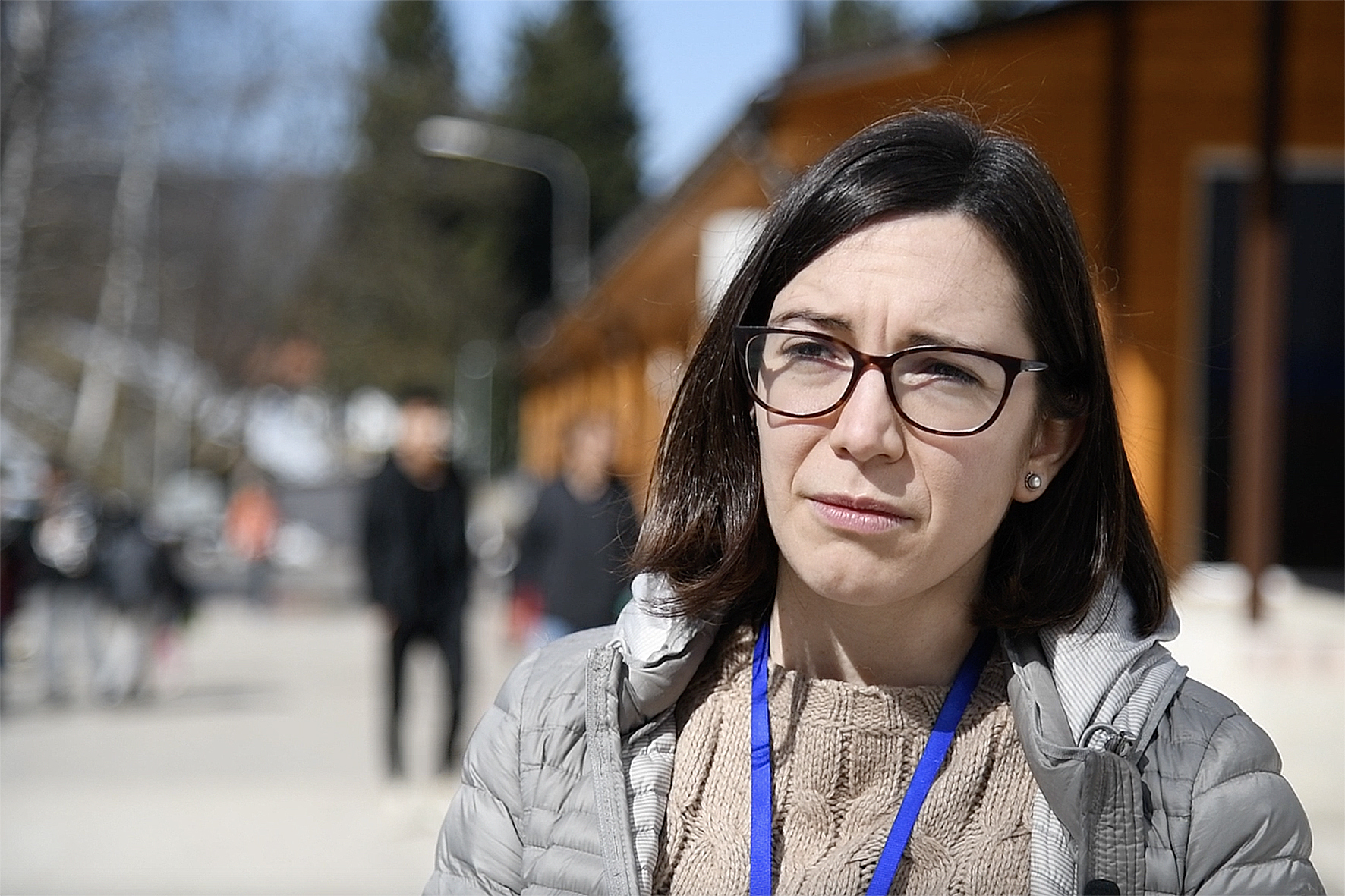 The voice of the IOM. Arrivals in Bosnia have decreased over the past two years because of the pandemic, making the influx of migrants more manageable. “Approximately 2,000 people are currently staying in Bosnia’s five temporary reception centres,” says Margherita Vismara, coordinator of the International Organisation for Migration (IOM) programmes. “The length of their stay in the camps varies. In Ušivak, for example, 20% of migrants remain for six months to a year, another 20% stay for more than a year and the remaining 60% for less than six months. Families wait to be reunited with relatives who are already in Europe, but the process can take a long time. For that reason, many people try the Game. As IOM, we try to prevent children and women from undertaking dangerous overnight treks through the woods, venturing into cold and snowy perilous areas to enter the EU. They walk up to 20 or 30 kilometres in one night, sometimes with small children. They have often got lost and managed to call us asking for help. In some cases, the Civil Defence and Mountain Rescue teams came to rescue them with snowmobiles. Arriving is not easy because Croatia is still not part of the Schengen Area, so they must reach Slovenia.”
The voice of the IOM. Arrivals in Bosnia have decreased over the past two years because of the pandemic, making the influx of migrants more manageable. “Approximately 2,000 people are currently staying in Bosnia’s five temporary reception centres,” says Margherita Vismara, coordinator of the International Organisation for Migration (IOM) programmes. “The length of their stay in the camps varies. In Ušivak, for example, 20% of migrants remain for six months to a year, another 20% stay for more than a year and the remaining 60% for less than six months. Families wait to be reunited with relatives who are already in Europe, but the process can take a long time. For that reason, many people try the Game. As IOM, we try to prevent children and women from undertaking dangerous overnight treks through the woods, venturing into cold and snowy perilous areas to enter the EU. They walk up to 20 or 30 kilometres in one night, sometimes with small children. They have often got lost and managed to call us asking for help. In some cases, the Civil Defence and Mountain Rescue teams came to rescue them with snowmobiles. Arriving is not easy because Croatia is still not part of the Schengen Area, so they must reach Slovenia.”
- Foto Calvarese/SIR
- Foto Calvarese/SIR
- Foto Calvarese/SIR
Fighting for a dream. Mazar Sharif attempted the Game several times. “I came here from Afghanistan,” says the young man, “I attended up to sixth grade, the first year of secondary school. I fled when I was still a child, together with my sister and her husband, because there was no future there. There is no freedom in my country, no jobs, only poverty. The situation has worsened under the Taliban regime: they break into your house and take you away. How can anyone live like that? I first fled to Iran to try to help my family, then I went to Turkey and Greece where I parted ways with my sister. I proceeded to Montenegro, Serbia, all the way here, to Bosnia. I walked from Greece to Bosnia. For three long years I tried to manage doing odd jobs and some help from home. I would like to go to France, I would like to continue my studies.”
“I often think about what a friend of mine who now lives in Germany told me: we have to fight for our future and to make our dreams come true. That’ s what I will do every day until I have enough energy.”
It’s getting dark, Daniel and Mazar return to their prefabricated homes. So does Sahim, but not before picking up his deflated football from beneath the car of a camp security officer. Just enough time to greet his younger friends. They will finish the match tomorrow. Waiting for the next Game…

